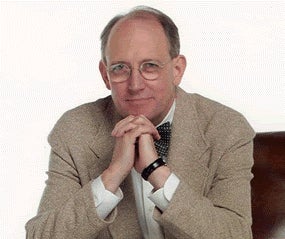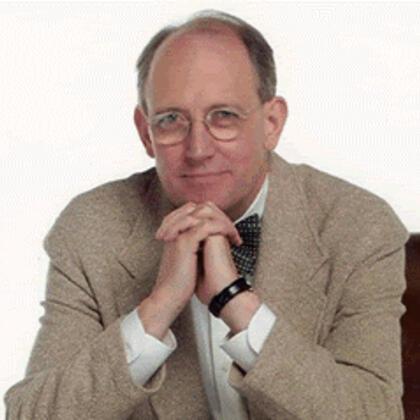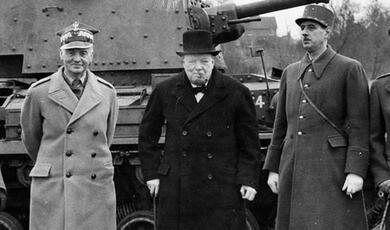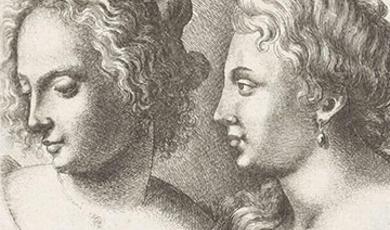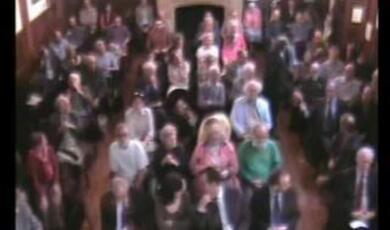Cary Grant: Hollywood's exquisite, charming enigma
Share
- Details
- Text
- Audio
- Downloads
- Extra Reading
To millions of moviegoers around the world Cary Grant epitomises the glamour and style of Hollywood in its golden years. With his luminous dark hair and mischievous smile he was one of its greatest stars. This lecture is an attempt to look behind the mask he presented to the world.
Download Text
Cary Grant: Hollywood’s Exquisite, Charming Enigma
Geoffrey Wansell
6 June 2012
I would like to take you back to the days when Hollywood was golden. It was always black and white but somehow it just seemed more beautiful and more exciting. It was a dream factory.
To millions and millions of cinemagoers around the world, Cary Grant will be for ever remembered for his glamour, his style, his dark hair and even darker eyes, that mischievous smile, effortless elegance, and that wit and that charm. Since his death in 1986, at the age of 82, the incandescence of that image has not dimmed for a moment. The actor Burt Reynold, once put it very well: “He was touched by the gods,” he said. When he walked into a room, men liked him as well as women, and that is a rare thing. Certainly, if the women in this audience were hypnotised, their male partners were never for one moment threatened; they only wished they could match his ageless, apparently effortless, appeal.
Steve Lawrence, the actor, once summed it up by saying, “When Cary walked into the room, not only did the women primp but the men straightened their ties.” It was entirely true.
The American Film Institute recently conducted a survey of the greatest male movie actors of all time, and Grant came second. Only Marlon Brando got more votes. And just think what that means. Think of the people who were left behind him: Jimmy Stewart, Robert Mitchum, Robert De Niro, Burt Lancaster, Spencer Tracy, Humphrey Bogart… goodness me, the list is absolutely endless! And it was directors, people like John Milius, Billy Wilder, Jeremy Thomas, Nick Powell and Stephen Frears, who elected him. It was not the general public. These were the professionals in the business. Cary was, perhaps more than anyone, the consummate professional. He made five films with Howard Hawks and four with Hitchcock, who called him his favourite leading man. In fact, he once said, “He is the only actor I ever fell in love with,” and, for Hitchcock, that was rare. He fell in love with the women, but not the men! He made four with Leo McCarey and three with Stanley Donen and George Cukor.
There was something about Carey. They recognised his extraordinary charm, that moment when he looked at the camera, when you thought, no one looks at the camera like that. No one is more brilliant, and yet, and yet, so enigmatic. Everybody wanted to have him. Mae West said, “Why don’t you come up some time and see me?” In Charade, Audrey Hepburn says, “I don’t bite unless it’s called for.” Every woman seemed to want to possess him but they never quite could, and that was one of the unmistakable elusive things that made him such an extraordinary star.
That disarming smile, that mannered charm. But there was always something going on behind it, and it was what was going on behind it that makes him truly interesting. It was Hitchcock who really got to the bottom of that. Hitchcock once said, “There is a frightening side to Cary that no one can quite put their finger on.” I am going to show you a little bit of the frightening side of him.
It did not detract from his charm, not at all. It did not detract from his ability to do comedy, not for a second. But it did make him hard to pin down. I have said that he was one of the movie industry’s biggest stars, the second greatest male lead of all time, but let’s just remember how big a star he would have been if, for example, he had taken Frank Capra’s offer to do It’s a Wonderful Life, if he had played Monty Woolley’s part in The Man who came to Dinner, if he had taken Gregory Peck’s part in Beloved Infidel, Ronnie Coleman’s in A Double Life, Gary Cooper’s in Love in the Afternoon, James Stewart’s in Hitchcock’s Rope, David Niven’s role in Around the World in 80 Days, Bill Holden’s role in The Bridge over the River Kwai and, of course, James Bond. He turned down every single one of them. He would have been, without question, bigger than Brando, had he taken a half dozen of those, or even four. He turned down Rex Harrison’s part in My Fair Lady, saying, “Not only will I not play Higgins, but if you don't use Rex Harrison, I won’t even go to the film.” He insisted that Robert Preston played The Music Man. This is a man who you might say was reluctant to be a star, but a star he nevertheless was.
But all the way through that time, he was also a troubled actor. He was troubled by his childhood, by his relationship with women, by his insecurity, and by the fact that he never quite felt that he deserved the acclaim that he had. A lot of that you can see in some of the performances. But never once, in 72 films over 33 years, was he ever anything less than the fussy, determined perfectionist that someone once called the “happy worrier”. He was not always an easy man to work with, no matter how he may have appeared on the screen.
I think Tom Wolfe put it very nicely when he said, “To women, he is Hollywood’s lone example of the sexy gentleman and, to men and women, he is Hollywood’s lone star, that most romantic of all things, the romantic bourgeois hero.”
I met him in 1978. I was at The Observer writing a column called Pendennis, which still exists, I am amazed to say. The ’phone phone rang one day and they said, “Would you like to interview Cary Grant?” Now, there is no person on the planet who would not want to interview Cary Grant, and they said, “Fine, come tomorrow morning,” to this rather remote flat behind the Hilton Hotel, “and ask for Margaret.” I thought that was fairly strange. It was a very bright February morning with a brilliant blue sky. I rang the doorbell, and this unmistakeable voice said, “Hello,” and I asked, “Is Margaret there?” and he said, “Yes, yes, come up.” So I thought okay! I went up and there, in all his splendid, snowy-haired glory, was Cary Grant.
It was, by complete coincidence, the day that Mae West had died, and so I said (thinking, what can one say to Cary Grant?) “You must be very sad about Mae West’s death.” He said, “Do you want coffee?” I said, “No, I mean she died over night.” He said, “Tea?” The one thing he would never do, ever, was talk about his performances or his co-stars. In fact, if he could avoid it, he would not talk about movies at all. What he did enjoy talking about was being an acrobat because he started in music hall, and as I left that extraordinary stuffy little flat near Shepherd’s Market that day, I thought, I have never seen anyone describe this movie star in the way he truly is, which is extraordinary. He was being looked after by the woman who was to become his fifth wife, Barbara Harris, who was the Press Officer at the Royal Lancaster Hotel, but he was really being looked after.
I went away and I thought, “I’ll write a book about him.” I wrote to him and the response was, “No, I don’t want you to do it, no, no, no. Nobody will talk to you.” So I took my family to Hollywood. We were so poor, we had to swap houses. It was terrible. And there he was, and we had a ’phone conversation:
“Oh yeah, okay, Jimmy Stewart is going to talk to you.”
“Oh, that’s great.”
“And I’ve told Doris Day.”
“Oh, that’s fine.”
He would drive past where I was living in a blacked-out limo (I used to sit in the window typing) because he wanted to see if I was really there, to see if I was really working. T he more that happened, the more convinced I was that this was a quite, quite extraordinary man.
But back to the beginning. Most people know that he was born in Bristol and christened Archibald Alexander Leach in January 1904, the son of a trouser-presser and a very unhappy woman. His mother, Elsie, probably coloured his life for ever. She was a Victorian through and through. She had lost a child after one year, who had died of pneumonia suddenly in 1901. Cary was not born until three years later, and when he arrived I think she simply smothered him. Her husband, Elias, was a neat, quiet little man who, after about six years of this, got fed up with both his wife and probably with Cary, who was then of course called Archie, and decided to set off and live with another woman whom he had found in Southampton. That did not last very long, so he crept back to the family home. But when Archie Leach was 10, his dad sent his mother to Fish Ponds Mental Institution, without telling his son. He went to school in the ordinary way, the men came at 11 o’clock, disappeared, and when he came bac, she wasn’t there. He was not to see her again for 20 years. He once said, “I was better known by the world than I was by my own mother.” It had an incredible impact on this incandescent figure. He never quite recovered.
He became a Boy Scout. He discovered the one place that he was happy, which was backstage in the Bristol Hippodrome. He got a job with Bob Pender’s troupe, which was stilt-walkers, in 1914, when he was 13. He forged a letter from his father, got a job, and then his father found out and got him back, but he still went back to Pender. Pender looked after him. His New York Times obituary said, “He was the acrobat of the drawing room.” He brought the skills he learnt in vaudeville and in musical to the screen.
He went to America with Pender. They toured for nearly two years. He did not say a word; he had not spoken a single word at this point. He was a stilt-walker and an acrobat. Pender went home, and Archie Leach decided to stay. He formed a stilt-walking act, partly on Coney Island, with Pender’s son Tommy and, very quickly, they play The Palace, which was regarded as the greatest thing in the Vaudeville calendar. And someone said to him, “You know, you could do more than this. Can you sing?” Well, he could sing a bit, though not very well, but he found himself suddenly starring in light opera. The light opera led to slightly more serious musicals, particularly a famous one called Nikki which he played in St Louis for nearly a year, and in Nikki he played a man called Cary Lockwood.
By now it is 1930, 1931. The Wall Street Crash has happened, but entertainment is still working. He and a friend, Orry-Kelly the stage designer, who may or may not have been his lover, asked him, “Why don’t you go to Hollywood?” So he and a friend called Phil Charig got in a Packard convertible and drove from New York to Hollywood.
A couple of people who knew him, including Billy Morris at the William Morris Agency, introduced him to B P Schulberg, who was the head of Paramount. At that time Paramount had a problem. Gary Cooper had done a runner. Gary Cooper was Paramount’s biggest star. He had decided that he was going on a safari with Lupe Velez. Lupe Velez was the Mexican spitfire, always regarded as the hottest woman in Hollywood. She died very young, unfortunately. But Cooper was off, so Schulberg was looking for a new leading man, and discovered this rather handsome young man called Cary Grant. They decide he has to have a new name. Schulberg said, “You can’t have that name. Archie Leach doesn’t work.” Grant said, “What about Cary Lockwood?” He was told, “No, you can’t have Cary Lockwood. Too many Lockwoods.” So they gave him a list of US presidents, and he chose Grant.
He became a contract star for $450 a week, not a small amount of money. They put him in some pretty awful stuff and he was not very good. However, the audience liked him, and in particular Mae West liked him. Mae West, was a force of nature. He played the love interest and she was a lion tamer. The film was called I’m No Angel and what is interesting is that it helped to save Paramount from bankruptcy. This and its predecessor She Done Him Wrong, another Mae West/Cary Grant picture, saved Paramount from the bailiffs.
It is arguably the worst performance that I have ever seen. He was so wooden, so bad, that it is almost impossible to imagine what he might have become. But nevertheless Mae West, and incidentally Dietrich in Blonde Venus, gave him confidence that he took to heart. Remember, this was in 1934, nearly 80 years ago, and life was a lot different then. He was earning, at that point, $750 a week, not a small amount for an actor, and certainly not a small amount in Depression America. But what happened is that he got confidence from that performance, and indeed from She Done Him Wrong, and he also decided, after having worked with Dietrich, that he would look at the lighting and he would try to be a perfectionist.
In the next three years he transformed his career. He moved in with Randolph Scott. I won’t try to describe Randolph Scott. Anybody who has seen a Budd Boetticher movie knows that Randolph Scott was a very handsome young man. They lived together for 12 years. Grant said later, “My first two wives insisted I was homosexual.” I would put it this way: he certainly wasn’t entirely heterosexual. But Randolph Scott and he had this bachelors’ hall, as it was called by Louella Parsons, and the two of them entertained and they were very happy together and confidence started to imbue. He started to forget.
The only difficult thing was that his father wrote to him, shortly after this film was made, to tell him that his mother had come out of hospital, and he took Virginia Cherrill, who was his first wife, who had starred in City Lights with Chaplin, back to see her. He married her the following day, in Caxton Hall, a marriage that lasted 15 months. Cary liked to marry, but I don’t think he really understood what it meant. He married five times. But Virginia Cherrill had to move in with Randolph Scott and Grant; they didn’t take a house together. She was rather upset by that, of course!
He suddenly ran into a number of people who saw what there was there. One of them was a man called Leo McCarey, a marvellous director, and another was Howard Hawks. Howard Hawks had worked with Howard Hughes, whom Randolph Scott had introduced to Carey Grant. Hughes had a project. He had found it as a play for his then enamourata – he was always romancing beautiful women – Katharine Hepburn, and he wanted to make it a movie. The movie was about an airhead heiress and a palaeontologist. This was the first time you really saw just how good Grant was. It was called Bringing Up Baby.
Grant hated that leopard in the movie, who was called Nisa, and he made his double do the scene where the leopard bites his trousers. He really loathed the animal! Hepburn, on the other hand, adored it and thought it was wonderful. Nevertheless, Bringing Up Baby effectively created what Peter Bogdanovich called “the perfect zany,” a man who could do comedy with perfect timing and at the same time be attractive.
Very shortly thereafter he made a set of movies along those lines, but he was never entirely happy. Virginia Cherrill, when she divorced him in 1935, had made a series of very violent criticisms of him in her divorce papers, alleging that he beat her, choked her and mentally abused her, and those accusations were to dog his entire career from a variety of women, many of whom he married.
Nevertheless, when you saw him in the movies, he lit up the screen. He was paid $112,500 for making Bringing Up Baby. That was in1937; think what it would be worth today. He went on to make a string of hits: Holiday with Philip Barry, also with Hepburn; Gunga Din with Doug Fairbanks Jr; Only Angels Have Wings with the young Rita Hayworth, who was called Judy in the movie, hence the famous mimic Cary Grant going, “Judy, Judy, Judy”: it was actually Rita Hayworth. He was still living with Randolph Scott, increasingly fastidious and a perfectionist.
On the way over from England to America when he went in 1920, he had seen Doug Fairbanks and Mary Pickford on the Olympic. They were of course in first class and he was in steerage. He was very struck by Fairbanks’ tan and the fact that he was very well-mannered, and so Cary set out to get himself a tan, and still everybody remembers Cary Grant as having a tan that was even greater than that of Simon Cowell!
He made, time after time, an attempt to give you the sense that there was something else going on, something behind the mask. He made a second film with Leo McCarey after The Awful Truth, which helped to cement the success of Bringing Up Baby, and this one was called My Favourite Wife. He had been married to Irene Dunne, but she disappeared on a Pacific island for seven years for an affair with Randolph Scott, to people’s surprise. Then she returned just as he was about to marry again; in fact the very day. He was often getting married in these movies, almost every single time! But when she came back the very day of the wedding, she was not too pleased that her husband was marrying someone else and, furthermore, she was becoming the stepmother to her children.
In My Favourite Wife Grant didn’t overplay, he didn’t steal the limelight, he didn’t try and mug; he did what he did with incredible grace and extraordinary charm, and it is performances like that that stick in all our memories, the reason that we prize him as much as we do, the reason that he was, and still is, treasured.
But sadly, at the same time, he was unhappy. He had started a relationship with an actress called Phyllis Brooks, which had not gone very well. He was still living with Randy Scott of course. They had, by this time, bought a beach house in Santa Monica, as well as the one in West Live Oak Drive in the hills above Hollywood, just beneath the Hollywood sign. Nothing really seemed to work. He was always complaining. When he worked with directors he was always fussing about something and although he drove some of them to distraction, yet when the camera was turned on something quite magical happened.
The Philadelphia Storyis a movie that none of us can forget. He played C K Dexter Haven, the ex-husband of Katharine Hepburn, and James Stewart played the reporter who came to report the society wedding. Of course everyone wants Katharine Hepburn to marry Cary Grant again. How could you not? This was remade in the musical High Society, but it absolutely captures those moments in 1940 and 1941 that were unforgettable and it was in the midst of the War. Cary had not joined up. He wanted to volunteer for the American Air Corps, but finally the American Government would not allow him to because they said he was too valuable to them as an actor, and in fact he did tours for the troops. David Niven, by contrast, had gone straight back, after his success, to Britain and joined up, serving in the commandos, but Grant did not. There were some people in Britain who were uncomfortable about that.
He was about to take American citizenship because he had met the heiress Barbara Hutton, the Woolworth heiress, who inherited $5 million when she was the age of five, and they had become a couple: he, this poor boy from Bristol, and she American royalty. He decided he wanted to marry her and she would not allow him to remain an English citizen for fear of her son, Lance Reventlow, being taken back to England, so he became an American, and he enjoyed it. But I do not think that it ever quite made him happy. He took Barbara Hutton back to visit his mother, Elsie. His father had died in 1935, but his mother was still alive. In fact she lived until two weeks before her 96th birthday. When he rang me up one time when I was doing the book, he said, “You’re only writing about me because you think I’m going to die.” This is in about 1975! I responded, “I think you are going to live as long as your mother, so don’t trouble yourself about it!” and he said, “Oh gee, mm, yeah,” in that voice of his. When they first started in America, they thought he was Australian. They used to call him Kangaroo when he was in the opera. So he had to change his voice. He changed everything, but there was still that incandescence.
There was a man about to come into his life who changed all that ‘perfect zany’ into something quite different. Alfred Hitchcock put him in a movie with Joan Fontaine, whom he had borrowed from Selznick for the movie. Grant played a conman, and he fixed upon a rather plain heiress, played by Jane Fontaine. The movie was called Suspicion.
I don’t think he was ever better. Frightening, but wonderful. At the end of the movie Grant, according to Hitchcock’s script, poisoned Jane Fontaine with a glass of milk that he carried upstairs to her bedroom. She wrote a letter to her mother, who of course was right all along – the family said don’t, for goodness sake, trust him – saying, “I don’t want to live any more. I know he is going to kill me.” She left the letter by the bedside, he gave her the milk, she drank the milk and she said to him, “Will you post the letter?” It was the Kind Hearts and Coronets ending, for the film buffs. He, of course, posts the letter. RKO, the studio, wouldn’t have it; they would not have Cary Grant play a murderer. They changed the ending, and ruined a film that could have been quite wonderful. In fact, Joan Fontaine was the only person Hitchcock ever won an Oscar for. She won an Oscar for Suspicion.
Grant never won an Oscar for a performance, which is one of the most extraordinary things in Hollywood history. For all his success and for all his admiration, the Academy never, ever once awarded him an Oscar. He was given an honorary Oscar in 1970 for his general contribution, but he was not given an Oscar for a single performance. And I would have thought, for example, that performance amply justified it.
What Hitchcock had discovered was the dark side to Grant. He discovered that here was a man who did have charm but at the same time, Cary was struggling with his wives. Barbara Hutton had a huge house and she had six staff. She invited people to supper every night, and he only wanted to come back from the studio and put his feet up and watch television, but no, she was entertaining. This went on and on, and he got more and more angry. Louella Parsons christened them “Cash and Cary”. It wasn’t a happy time and in the end she moved out. Then they had a reconciliation, and then she moved out again – it was just a disaster! But still, when he went to the studio, he made extraordinary films.
He made, with Howard Hawks, a remake of The Front Page, the famous play and film, but in this one the parts were slightly changed. Grant plays the editor, and Rosalind Russell – the part had been offered to everybody, including Jane Fontaine incidentally – played the reporter, Hildy Johnson. She was his ex-wife – back to the ex-wives again! – who is going to marry Ralph Bellamy, except everybody in the audience knows that she is not really going to marry Ralph Bellamy. Whoever marries Ralph Bellamy?! No one ever married Ralph Bellamy – certainly not in the movies anyway. So the two are conniving. He is the editor, she is the ace reporter, and they have got the killer, Earl Williams, hidden in a desk in the press room. This movie allowed overlapping dialogue, which Robert Altman then went on to do in MASH. A lot of people claimed credit for it later, but this was the first time that it was ever properly used. At some point Grant was so astonished that he looked at the camera and said, “Are you going to allow her to get away with that?” which is still in the cut of the film.
His Girl Friday could be called the epitome of Grant at his absolute best. As the ’forties went on, he wanted to make films that were more serious. He made Arsenic and Old Lace, rather unhappily, with Frank Capra, and said afterwards Jimmy Stewart would have done it better. He made None but the Lonely Heart with his friend Clifford Odets, who replaced Randy Scott as one of his real companions, in an attempt to win an Oscar (but didn’t). He took a year off, and then made Night and Day, a biopic of Cole Porter.
And around this time he met the woman became his third wife, Betsy Drake, who, believe it or not, is still alive, living in Hampstead. Betsy Drake was an actress. He saw her in London. He had come for a trip and he saw her on the Queen Mary going back to America, with Freddy Lonsdale, the playwright, one of his friends, and they became a couple. She had many qualities, but one of them was not particularly acting, although they did make some movies together, including Every Bride should be Married and Mr Blandings Builds his Dream House.
She also introduced him to all kinds of psychotherapy, including experiments with what was then legal but now isn’t, the psychotic drug LSD, which was administered by a man called Mortimer Hartman. When writing my first book, I found Mortimer Hartman in a rather flea-bitten hotel in New York, and I asked him what on earth possessed him to give Grant these two-hour sessions. He replied, “Oh well, it freed his mind.” To be fair, Grant said it did; he thought it was a help. I found that difficult to understand and very difficult to appreciate, but what is true is that Betsy Drake brought him a sort of peace. He effectively retired. He said, “I’m not going to act, I’m going to give it up,” although he also said he might make little things now and again, which he did, for example I was a Male War Bride with Howard Hawks, but really the career was going, and by the time he got to 52, he had married Betsy Drake.
It was Hitchcock who got him back. He said, “I’ve got a fantastic piece for you. It’s going to be set in the French Riviera.” Cary liked glamour. “And you’re going to get to co-star with Grace Kelly,” who had just won an Oscar for The Country Wife, not playing a glamorous woman, but the wife of a drunk, “And it’s going to be wonderful.” Grant took one look at the script, which is superb, and said okay. He played a retired cat burglar called John Robie, whom Grace Kelly believes has gone back to his old ways and is stealing. I have never seen Grace Kelly better and I have never seen Grant quite as wonderfully underplayed. The film of course is called To Catch a Thief. Hitchcock didn’t hold back on the fireworks!
Grant only made a handful more films. He went on to make The Gun or, as it was called, The Pride and the Passion, with Sophia Loren, whom he fell in love with, much to Betsy Drake’s disappointment. He then made Houseboat with Sophia Loren, which includes a wedding when Loren and Grant got married, and that very day she got married by proxy to Carlo Ponti, to whom she remained married.
Betsy Drake exited stage left, rapidly replaced by Dyan Cannon, whom he saw on a television show called Malibu Run, and then rang her agent and said he wouldd really like to meet her. It really does take your breath away –there is a man truly sad! They had a daughter called Jennifer, who is 46 now. Dyan Cannon too, I’m afraid, did not last, and was replaced by the lady I met him with in the ’seventies after he had retired.
He turned down countless incredible roles asking him to come back, but I think that Cary Grant did not want to appear as an old Cary Grant. He did not want to appear as an aging Cary Grant. He was not like Spencer Tracy. He was not like Jimmy Stewart. He was not prepared to do that; he wanted to preserve his incandescent image. I think John Robie is an absolutely perfect example. North by Northwest is very good, but it Is not anywhere near as good as To Catch a Thief.
Essentially, he retired and became a recluse. He lived with Barbara Harris, in the house that Howard Hughes bequeathed to him, in Bellagio Road, with 12 acres of grounds: a vaguely happy man, still uncertain about his own sexuality. He had a brief relationship with a British girl called Maureen Donaldson, a daughter of a Muswell Hill fireman. And he turned down $5 million to write his autobiography.
In the ’eighties he went out on a series of lecture tours, An Evening with Cary Grant, and he got the audience. He didn’t do anything: the audience just asked him questions and it was in fact Barbara Harris who encouraged him to do it. It was on one of those occasions that he had a heart attack and died, in November 1986, at the age of 82.
I think he was, quite simply, one of the great movie stars. If you compare him today, I suppose he would be the George Clooney of his day, but I think there was a great deal to him, and I hope that I have given you a small indication of that.
© Geoffrey Wansell 2012
This event was on Wed, 06 Jun 2012
Support Gresham
Gresham College has offered an outstanding education to the public free of charge for over 400 years. Today, Gresham College plays an important role in fostering a love of learning and a greater understanding of ourselves and the world around us. Your donation will help to widen our reach and to broaden our audience, allowing more people to benefit from a high-quality education from some of the brightest minds.


 Login
Login
